In today's digital world, we have websites and applications for everything. There is a digital platform for everything from groceries and FMCGs to various services like that of banks. Additionally, we also have the services of digital lockers and wallets, which have made our life convenient.
With all these digital platforms coming into play, hackers' threat continuously looms over the top of our heads, giving us countless sleepless nights. Considering that we have a lot of financial and private data stored on electronic servers, our passwords have come out as the new form of lock and key, intended to keep unwanted characters out.
When we have so many accounts and platforms where we register to avail of various services, we must have a place to store all these passwords safely. Additionally, we also need something which helps us optimize our passwords with a combination of different numbers and alphabets to keep away unwanted individuals. This continuous threat that looms over our head has arisen the need for a password manager that takes care of our passwords.
What is a password manager
Password Manager is a tool that keeps in mind the present-day needs. These password managers keep track of all your login credentials and help you create strong passwords. These password managers have come as a boon when everybody seems to be struggling with their digital security.
What is the need of a password manager
While the digital world has created many opportunities for individuals, it also seems to have created unwanted opportunities for people who aim to swindle money out of others. This need for security from the notorious characters has made it imperative that all these security threats are discovered and handled correctly.
A lock and a key are the traditional tools that help keep the thieves, swindlers, and other notorious characters out of our houses and workplaces. In today's world, we store money in the form of data on digital servers, and the internet helps us to manage our assets. Hence, the need for these password managers.
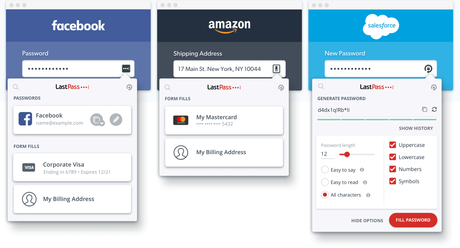
Additionally, when you are a businessman or an entrepreneur with many resources in the form of data and digital assets, it becomes essential that you have a system that protects it. Password managers have come forward as that system, which has grown to become every business's functional requirement. Today, every business from small to big uses one of this software like 1Password, LastPass, etc.
What are the key features of a password manager?
A password manager brings various features and benefits to your portfolio. From creating the passwords to storing them in a safe and secured vault, there are many functions that an effective password manager can do for you. To understand the various benefits and features of a password manager, let's look at some points below.
You must have noticed that different websites have a certain requirement when it comes down to password. These websites will give you a combination of numbers. Alphabets and upper and lower cases, amongst others. Additionally, these websites will also categorize your passwords as weak or strong.
This categorization of the passwords is primarily to increase the strength of your password so that it can safeguard your interests and information from falling into the wrong hands. A password manager makes sure that your passwords are strong enough to protect you and your data from others.
A password manager helps you create passwords with an optimum length, using different characters, cases, etc. to fulfill the requirements and create the most durable shields for your protection. Additionally, it is also essential that these passwords be random and untraceable. The password manager application makes sure that it generates random passwords that do not follow a set pattern so that it is difficult to hack your secure servers.
A password is not the only thing that you need to remember, which concerns your digital accounts. These are also the usernames. While some websites use your phone numbers or email addresses as your usernames, other sites let you define your username.
A password manager not only saves your credentials but also helps you define your credentials wherever needed. These password managers are robust tools that keep your passwords and usernames for many different accounts.
- Helps with the help of a master password
The best thing about using these password managers is that all you need to remember are the log in credentials (password and username) of one account. That account is your password manager. The password of your password manager works as a master password, making sure that only you can access your information.
- Watchtower to analyze the password's strength
A password manager also acts as the watchtower over your passwords, which you define. While most of the websites define some minimum requirements for your password, including different lengths and characters, the password manager acts as a watchtower that will warn you when it finds that your password does not have the optimum combination that can safeguard you and your interests.
- Helps store additional important information
An efficiently designed password manager understands that your usernames and passwords are not the only things that you need to store in a digital place securely. Considering this, many password managers offer you the option of storing your credit card details, debit card details, bank account details, etc. all at one and secure place.
- Sends out auto-reminders and password change suggestions
These password managers tracked the time when you changed your password the last time. And also, they hold all your different passwords. Whenever this software thinks that it has been too long since you last changed your password or your password for different accounts is the same, they will send you a reminder asking you to change your password for better digital security.
Whenever a password manager finds that someone is trying to hack into your system or trying to make a phishing attempt, it'll send a direct message to the owner, asking them to take necessary steps.
- Helps by providing easy and fast access
These password managers can easily synchronize with your mobile phone and laptops, helping you login to different applications and websites with relative ease. You just need to remember one set of username and password, and you are ready to use all the other platforms with the help of auto-sign in features which most of the password managers provide.
Some of this software allows you to share your login credentials with multiple other users like your friends and family in the most secure manner possible. While you should not share private and vital information like passwords and usernames, if you need to do it, then a password manager has got you covered.
- Helps with embedded layers of security
It is imperative to note that whenever a new system is developed, some notorious people find a way to exploit the systems. Similar is the case with the digital world. While the cybercrime units are vigilant and tighten the noose around these hackers and scammers, we need to take appropriate measures.
Working towards this particular cause, the essential feature and benefit of using a password manager are that it comes with additional security layers. These additional security layers protect your password from the hacking attempts and other malware.
- Helps to change your password easily
A password manager allows you to change your password most easily. You can change your password anytime but just logging in to your password manager no matter what platform you want to access.
What are the risks involved with a password manager?
There is nothing in this world that is 100% safe. There always remain some shortcomings or loopholes which affect the level of security of a system. No matter how many firewalls or protective layers one might add, there is always someone looking for ways to break the protective wall.
These password managers are built keeping privacy and security as the primary objective; these password managers are not 100% safe. The hackers are in constant search of targets. Because you store all your passwords and login credentials at a singular place, you might end up as victims.
Now that we understand the key features of a password manager, let's look at the key differences between 1password and LastPass.

What are the key differences between 1Password and LastPassword?
1Password and LastPass are two popular and most efficient password manager services. To understand which of these two tools is better, let's look at the key differences between the two.
Using the password manager to create and store passwords
1Password and LastPass will allow password generation for any one of your accounts as well as providing suggestions. The apps take your input regarding the length of your passwords and the usage of special characters. After the apps obtain the details, the apps generate long passwords. These passwords are quite strong and make it difficult for hackers to crack the code.
Both 1Password and Lastpass also provide the ability to store your passwords securely. Password managers' ability means that the task of remembering complicated, lengthy passwords is a thing of the past. You will only need to access the main account with a single password. This password acts as a sort of master key that can unlock access to all your accounts.
1Password and LastPass help determine how secure your account is by helping to rate your passwords' strength. You can modify and change passwords regularly while retaining the old ones and even re-using them.
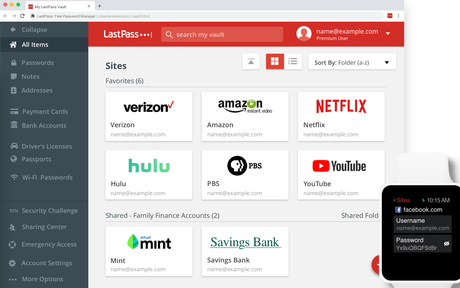
1Password and LastPass also provide safe and secure storage for essential credentials like credit card numbers, bank account numbers, important files, and documents as well as address information. This data is stored securely without risk of theft.
The password strength and security assessing feature in 1Password is Watchtower. Watchtower analyses your passwords, telling you about their strength, frequency of usage, and recent breaches. In case of a risk, 1Password doesn't change the passwords automatically but gives you warnings.
The similar feature present in LastPass is called the Security Challenge. While this also provides password analysis, an added benefit is the function to change auto-generated logins easily.
Conclusion
Considering all these points, it is safe to assume that the LastPass has the edge over 1Password.
1Password vs LastPass: User interface
The interface of an app or software, more often than not decide its popularity and adaptability.
LastPass is more focused on ease of access and easy visualization. However, the structure is essential. The icons are large, and the menu is simple. But locating and accessing information is more comfortable, despite the layout making it look old-fashioned.
1Password has gone the other way in terms of UI. They have opted for a filing system layout, with details stored under various headers, or folders. There are different categories and helps you track specifics. This design promotes better management and greater efficiency. This system is also familiar to users who get the same layout on various social media sites. But the most vital feature is the tagging system. This tagging system lets you create multiple flags for your data and tag them, helping arrange it as required and in accessing it.
Conclusion
When it comes down to the user interface, 1Password is definitely better.
1Password vs LastPass: Compatibility across different platforms
When deciding to use an app like a password manager, one of the main focus points is checking to see how well the app integrates and functions against a wide variety of Operating Systems. A successful password manager needs to integrate across your phone, tablet, laptop, smart home setup, etc. The number of devices we use in our daily lives has increased dramatically. If incompatible, you shall not be able to benefit from using the password manager app.
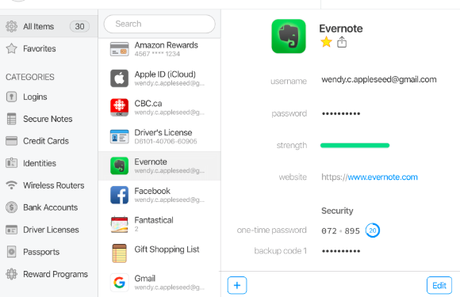
1Password has versions compatible with Windows, Mac, Android, ChromeOS, and Mac, as well as an option to add extensions to your browsers for a seamless experience. Connecting the different versions to your primary password vault requires you to generate a secret key, helping ensure security. Currently, 1Password has extensions compatible with Firefox, Edge, Chrome, and Brave.
LastPass has Windows, Android, Mac, and iOS compatible apps, but the variety of browsers that support LastPass extensions are more impressive. LastPass has extensions for Edge, Opera, Chrome, Safari, and Firefox. The extensions are functional on all major Operating systems, including Linux.
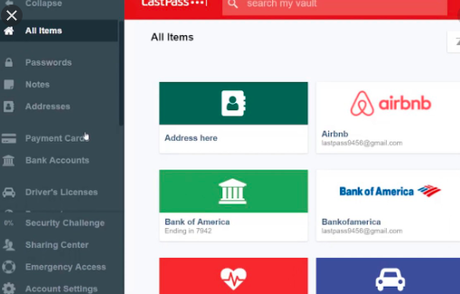
Conclusion
Due to the various features that both of these password managers provide, it is hard to discover which one is better in this aspect. So, we'll call it a draw.
1Password vs LastPass: Storage capacity and options
These apps allow you to store passwords and sensitive data on their servers. Other users also get secure and encrypted data storage. This data can be accessed by you, even if you change devices. The app can retrieve all the data stored on the servers.
But 1P has the edge over LastPass as it also creates local storage that helps access your data even in terms of low connectivity, or other issues that prevent syncing.
Conclusion
1P has a clear edge when storage is considered.
1Password vs LastPass: Account recovery and fail-safe measures
Since neither 1P nor LastPass has access to your password, in the event you forget it or face a situation preventing access to the key codes, you will be unable to access your accounts. But all is not lost, as recovery is possible in these scenarios as well.
1Password uses an 'Emergency Kit' that you are to complete when signing up for the service. This Emergency Kit contains all the necessary details such as email address, master password, and other essential information. This document needs to be kept safe by you either in hardcopy or in an offline encrypted version. If there is a hindrance to accessing this document, then the only way to access your account is through a device with an active version of the 1Password app.
LP does not have such a stringent recovery system. This app allows you to enable a recovery and authentication system using email passwords or text message codes. These notifications will allow you to unlock the password manager when you forget the password of your password manager.
But you can only use this method only once. After you use this method of recovery, you need to change the master password immediately. If strong memory is not your strong suit, you can also set up third party emergency access. Though this measure considerably reduces the level of security.
Conclusion
LastPass takes the lead when we compare the account recovery options.
1Password vs LastPass: End-user support
No matter how advanced and efficient the software, some glitches always tend to happen. Considering this possibility of technical faults and other concerns, both of these password managers have dedicated teams for customer support.
These teams are well trained and specialize in providing quick resolutions for all the queries. The only drawback with customer support, which is common between both, is that they don't have a chat or telephonic call support. The only way to reach out to 1Password and LastPass for your concerns is through email.
Conclusion
Since both of these password managers have similar features and quality when it comes to customer support, they both are equal. If you are considering customer support as a parameter to finalize on one of these, you can go for either of the two without any worry on your mind.
1Password vs LastPass: Teams and Group Access
Both LastPass and 1Password have different policies and plans for team sharing. You can analyze your business needs and subscribe to one according to your requirements.
If you have multiple employees in your business undertaking, it will be sensible to share the vault for individual employees. Additionally, you can also opt-in for a long term contract with 1Password. If your business demands that you have more access over the access right, you can always choose the business plan by paying $7.99 per month for every user.
However, LastPass lets you add additional team members to your business account for $4.50 for every user per month. Additionally, LastPass has also set up additional tiers for businesses like Teams, Enterprise, MFA, and Identify. These other business tiers come handy for different business requirements.
Conclusion
While both of these password managers solve various requirements through their different packages, 1Password has the edge over LastPass.
1Password vs LastPass: Pricing Plans
1Password offers a free trial period of 30 days with all the original features. Once the trial period expires, 1Password costs $3 per month for a basic subscription and $5 per month for a family account.
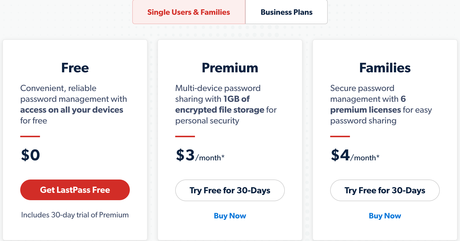
Additionally, the team policy is for $4 a month, and the business policy starts at $8 a month. These plans are suitable for you if you want to create and analyze your usage reports, provide guest access, and need storage capacity. 1Password provides you with 5GB of storage for your documents.
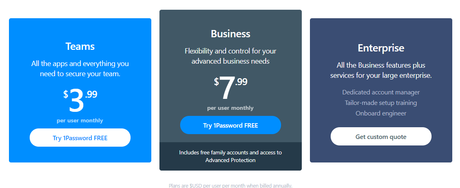
However, LastPass has slightly different pricing strategies for its end users. LastPass offers a free basic version for its single users with no strings attached. LastPass also gives additional storage and more efficient storage if you are willing to pay $3 a month for its users and $4 for a complete family plan.

Additionally, the team plans for its users is available for $4 per month and $6 a month for business enterprises. These plans for teams and businesses come with extra features like Identify Cost Extra or MFA. Moreover, you'll need a premium plan if you want the function of sharing secured folders with other team members.
Conclusion
So, if we compare the costs between 1Password and LastPass, LastPass comes out a little ahead, supporting multi-factor security authentication within a budget.
Can 1Password Be Trusted?
1Password is one of the best password managers available in the market, if not the best. They have extensive security layers that are very effective when it comes to data protection. Moreover, they have a strict confidentiality clause that prohibits 1Password from accessing the data they are storing for you.
Also, it is worth mentioning here that LastPass had a security breach in 2015. While it was noted that the hackers didn't take any sensitive data and information away, 1Password never had to face such a situation. Thus, it is perfectly alright to trust 1Password with your passwords and private information for safeguarding.
Quick Links:Conclusion: 1Password or LastPass Comparison 2020
Both 1Password and LastPass have tons of features which come very hand while managing your passwords and login credentials. However, there are certain additional features and benefits, which makes 1Password a better option for your personal or business use alike.
1Password is a better and user-friendly interface that helps you efficiently manage multiple accounts across different platforms. Moreover, LastPass' interface hasn't seen an update in years. However, the 1Password interface gets regular updates keeping up with the new in the industry.
1Password has an intuitive interface that improves functionality and puts it ahead of LastPass in many senses. This intuitive interface makes it for the best option in the world of password managers. Additionally, it is essential to note that if you have budget constraints and prefer something pocket friendly, LastPass is the way for you to go.

